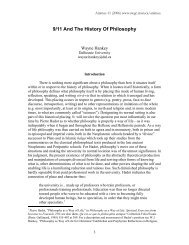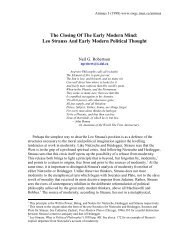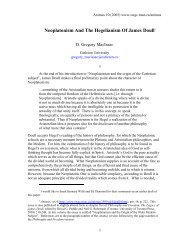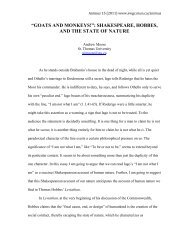Floy E Andrews, On Reading Philosophy after Analytic Philosophy.
Floy E Andrews, On Reading Philosophy after Analytic Philosophy.
Floy E Andrews, On Reading Philosophy after Analytic Philosophy.
You also want an ePaper? Increase the reach of your titles
YUMPU automatically turns print PDFs into web optimized ePapers that Google loves.
ANDREWS: ON READING PHILOSOPHY AFTER ANALYTIC PHILOSOPHY<br />
(b') Of no finite person is it true that any game depends for its actual<br />
existence on being played just by him;<br />
Ergo (c') Every game depends for its actual existence upon being played<br />
by some non-finite person. 28<br />
Geach again does not see or refuses to grant that where Berkeley says "seeing they<br />
depend not on my thought and have an existence distinct from being perceived by me,<br />
there must be some other mind wherein they exist..." he means that sensible beings<br />
depend on the thought of no finite mind, not as he would have it "of any particular finite<br />
mind". The so-called "parallel argument" is not parallel to Berkeley's at all but to Geach's<br />
misinterpretation of it. It is difficult to account for Geach's obtuseness except as a<br />
blindness to argument which goes beyond the capacity of "classical logic". 29<br />
What do these arguments which he criticizes share In each case, the premise is given<br />
a finite interpretation which is not supported in the text. Why this finite interpretation<br />
Why must an "end" be only a finite end Why must a mind in which perceived things<br />
have their being be a finite mind Why must "everything" in Spinoza be interpreted, not<br />
universally, but as the finite "anything", some particular thing What exercises Geach is a<br />
movement from (x)(Ey)Fxy to (Ey)(x)Fxy, which clearly in "classical logic" is<br />
unwarranted as one can see by counter-example or by an expansion of those two<br />
formulae. 30 If each of the texts is given the finitist interpretation, then there would be the<br />
illicit movement Geach identifies. But if the texts are read as embodying universal<br />
principles of ethics, of metaphysics, then in each case (x)(Ey)Fxy is an improper<br />
formulation of the premise. Indeed there is no proper formulation of these matters in the<br />
formal system of PM. Why Because arguments where connections between premises<br />
and conclusion are not simply external but depend on necessary relations between subject<br />
and predicate, between premises and conclusions, cannot be stated in this logic; because<br />
arguments of strict universality, which imply, in the words of Aristotle, "not only that<br />
such and such is the case, but why it is the case and it couldn't be otherwise", cannot be<br />
formulated or adjudicated in this logic; because arguments which depend on content for<br />
their power and weight cannot find a place here. The formal system of PM is a logic alien<br />
to philosophy and therefore it is a wholly inappropriate standard for appraising<br />
philosophical argument.<br />
28 Ibid., 4.<br />
29 His distortion of Spinoza, Ethics I.17, "Nothing can be imagined more absurd or more contrary to the<br />
Divine omnipotence" than to deny that God "can effect everything that is within the scope of his power"<br />
again misses the point. [Geach interprets it as meaning that God can effect anything within his power.]<br />
Spinoza speaks there of God's omnipotence, and where he says "everything" he means it: everything that is<br />
possible exists for Spinoza. It was precisely this that turned Leibniz from Spinozism. Cf. "Two notations<br />
for Discussion with Spinoza", Dec. 2, 1676, in Louis Couturat, Opuscules et fragments inedits de Leibniz,<br />
Paris, 1903, 529-30.<br />
30 . Geach gives this counter-example: interpret (x)(Ey)Fxy as "For every boy there is some girl such that he<br />
love her; with the same substitutions (Ey)(x)Fxy would then be "There is some girl (say, Sally) whom<br />
every boy loves. These are clearly different, and the second cannot be derived from the first.<br />
102

















